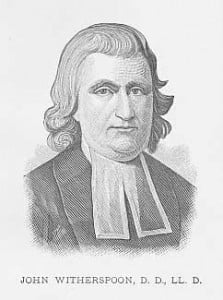Great blessings in small packages. Some years ago, the PCA Historical Center received the donation of a complete set of a small periodical issued by Dr. William Stanford Reid. The little periodical titled REFORMATION TODAY only ran for about three years. One sample from those rare pages:
“Needed: Historical Perspective”
by William Stanford Reid
[excerpted from Reformation Today —Volume 2, Number 4 (February, 1953), pp. 11, 17.]
History is God’s possession. This is the repeated assertion of the Scriptures. Whether dealing with individuals such as Pharaoh, Cyrus and Judas, or with nations such as the Jews or with kingdoms such as Babylon, Egypt or Rome, this is always the point of view. Every item, every event of history is worked out according to the purpose and plan of God, “who worketh all things after the counsel of his own will.” Moreover, this plan and purpose finds its culmination in redemption, accomplished by Christ and to be made complete at history’s final day.
The implications of this point of view for the history of the Church since apostolic days are numerous. The most important is, however, that Christ, who is “head over all things to the Church” is guiding and ruling His people. ,He is bringing His elect into the Church and punishing those professing Christians who prove unfaithful. In this way the history of the Church has for the Church a twofold objective. It is a warning of what befalls those who are not obedient. This is mentioned repeatedly in the New Testament. (2 Tim. 3:8; Heb. 3:17-19; Rev. 2,3). At the same time the history of the Church is a means of instruction, whereby it is warned, encouraged and strengthened. (Rom. 4, 9-11; Heb. 11; 1 Cor. 10:11).
For this reason the Christian has a very real obligation to the Church’s history. He, and the Church as a whole, must take it seriously, regarding it as part of God’s means of guiding and directing the Church by the Spirit into all truth. (John 14:26; 16:13). For this reason history is not to be discarded, nor disregarded. It is the revelation of how God deals with His people, which is also the fundamental message of the Bible. The only difference is that the Church does not have since Apostolic days, an inspired record, nor an inspired interpretation,. Therefore, it is the Church’s obligation, not only to understand its own history, but also to evaluate and interpret it in the light of God’s Word.
There are, however, dangers at this point. If one adopts a proper point of view, they may not be great, but there
is always a tendency towards traditionalism and conservativism. Because this, that or the other doctrine has been believed, or because this, that or the other practice has been followed, such must still be the case. This can only lead to aridity and pharasaism which will bring the Church to the grave.
The greatest danger, however, amongst present day Christians, is in the other direction. They tend to disregard the Church’s history. They adopt the attitude that it is unimportant “Let’s not have Calvin or Wesley or Machen,” they say, “But let us get back to the Scriptures. Only then shall we know the truth.” In this way they are adopting the position, that before this age no one has ever really wrestled with problems of the faith, and what is even more important, no one has ever found a solution. They imply that their problems, their needs and their ideas are absolutely new. Therefore history cannot help.
To an historian such a point of view is utterly ridiculous, for in history “there is nothing new under the sun.” The new problems are the old. What Augustine, Calvin, Kuyper and others had to face, we also have to deal with today. We cannot escape from the world in which we live, a world made up of past history.
This anti-historical attitude, however, is very dangerous. Its proponents feel that in a year or two they can achieve the results which the Church has achieved only over 2,000 years. Consequently they often fall into old errors and heresies which could have been easily avoided if they had known some his Moreover, they would be much humbler than they usually are, for they would see how utterly fallible are all Christians.
Today the Church suffers from a rejection of history. This is one of the evangelical’s greatest weaknesses. Therefore, let us study the Church’s history, the history of God’s people,, in order that we may the better know Him who is the Church’s only Lord and King.
William Stanford Reid, Reformation Today —Volume 2, Number 4 (February, 1953), pp. 11, 17.

 MEMORIAL MINUTE FOR HAROLD SAMUEL LAIRD [8 August 1891 – 25 August 1987]
MEMORIAL MINUTE FOR HAROLD SAMUEL LAIRD [8 August 1891 – 25 August 1987]